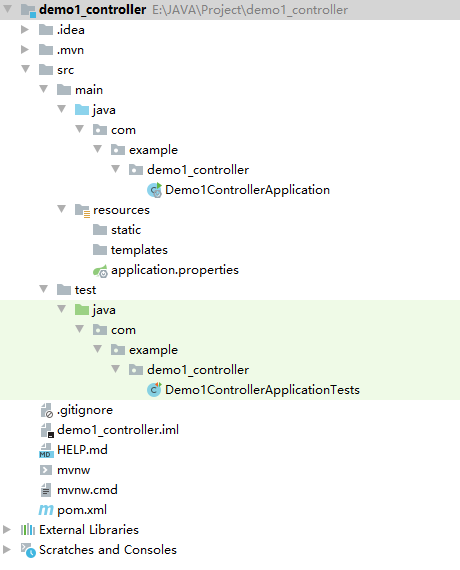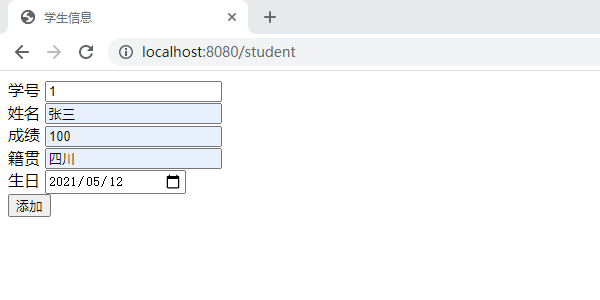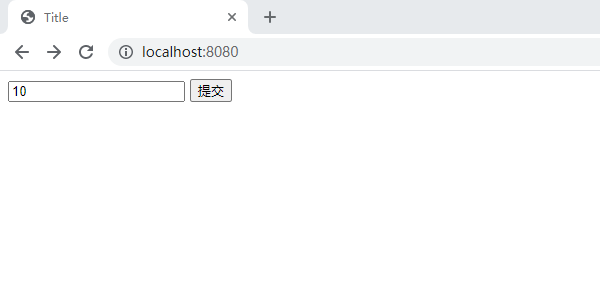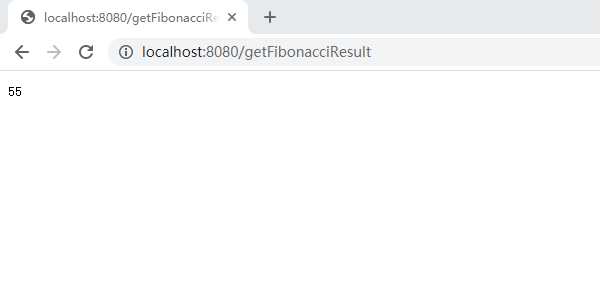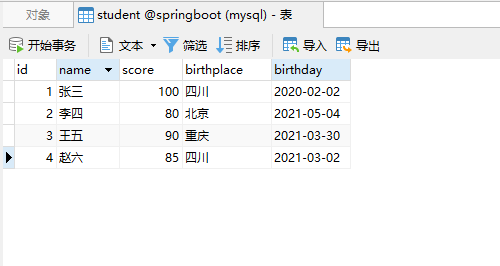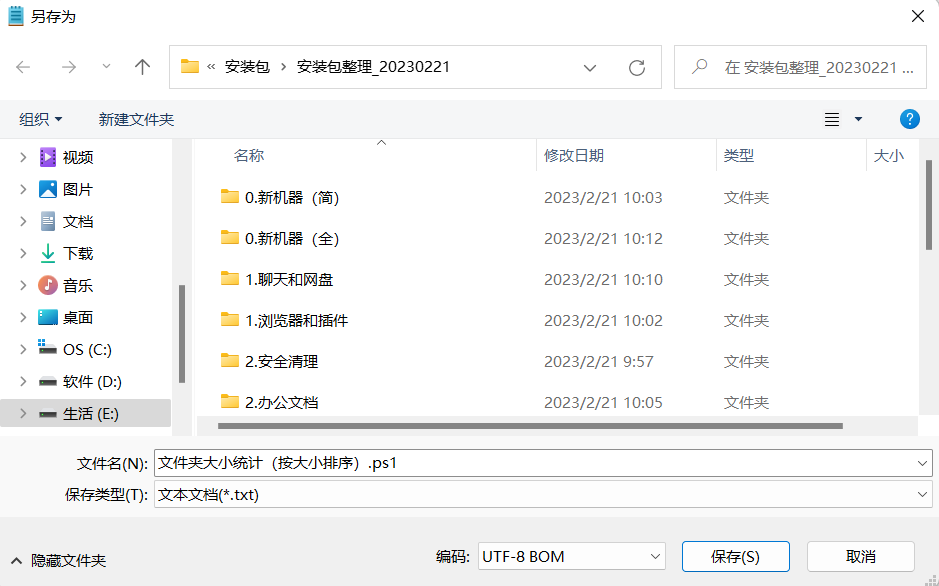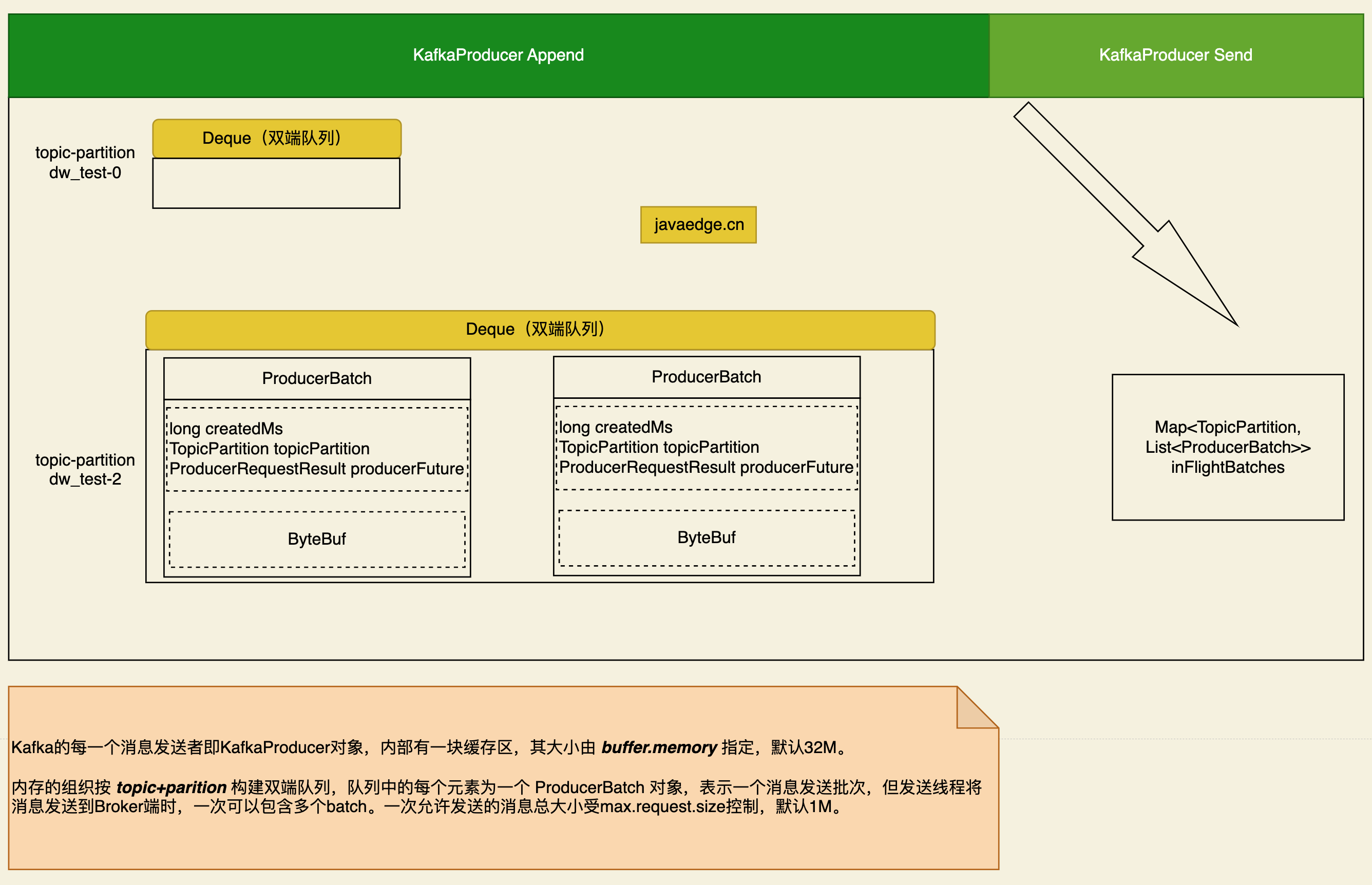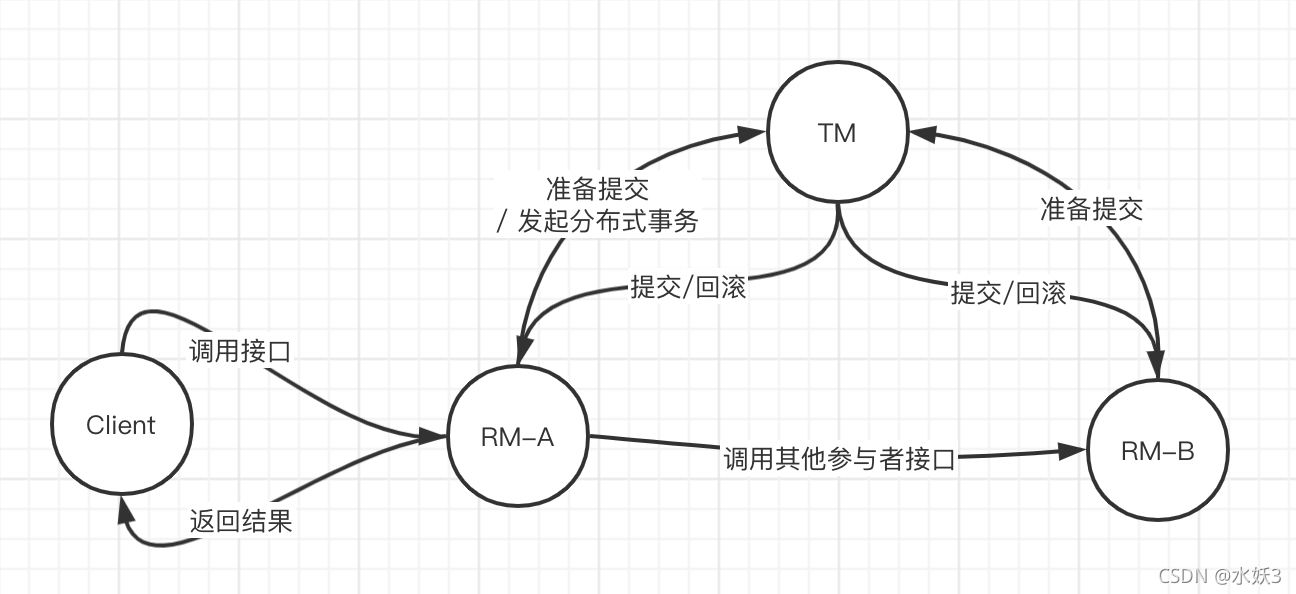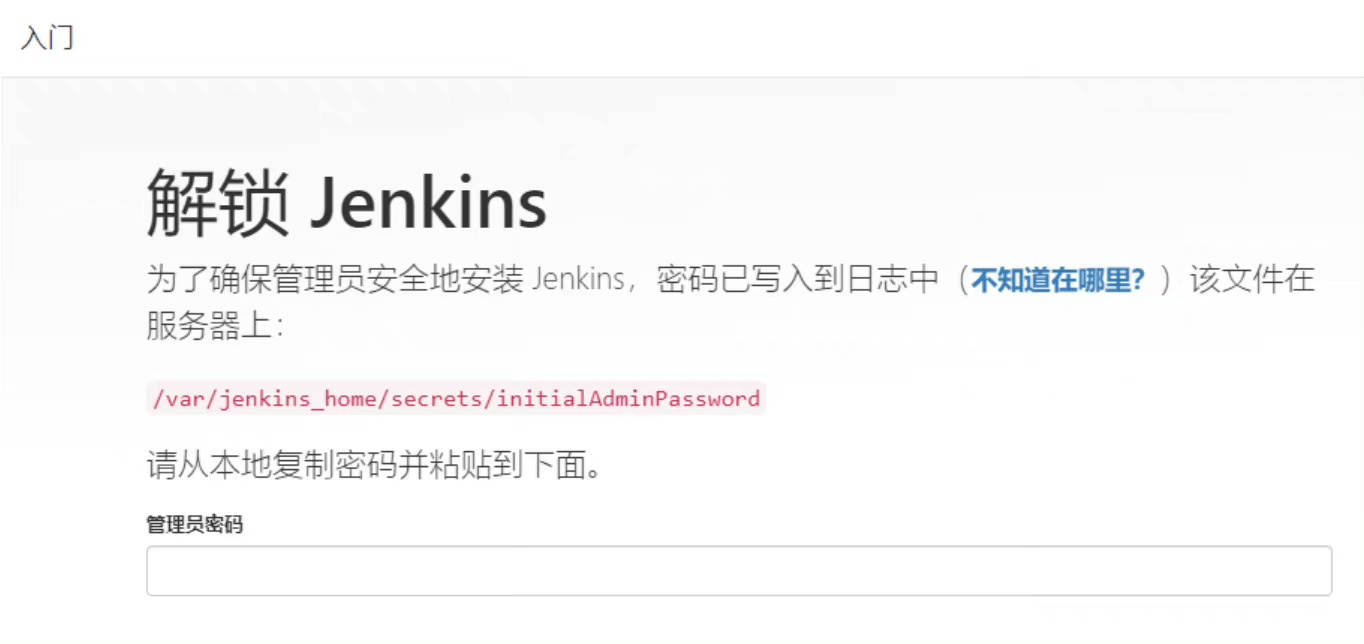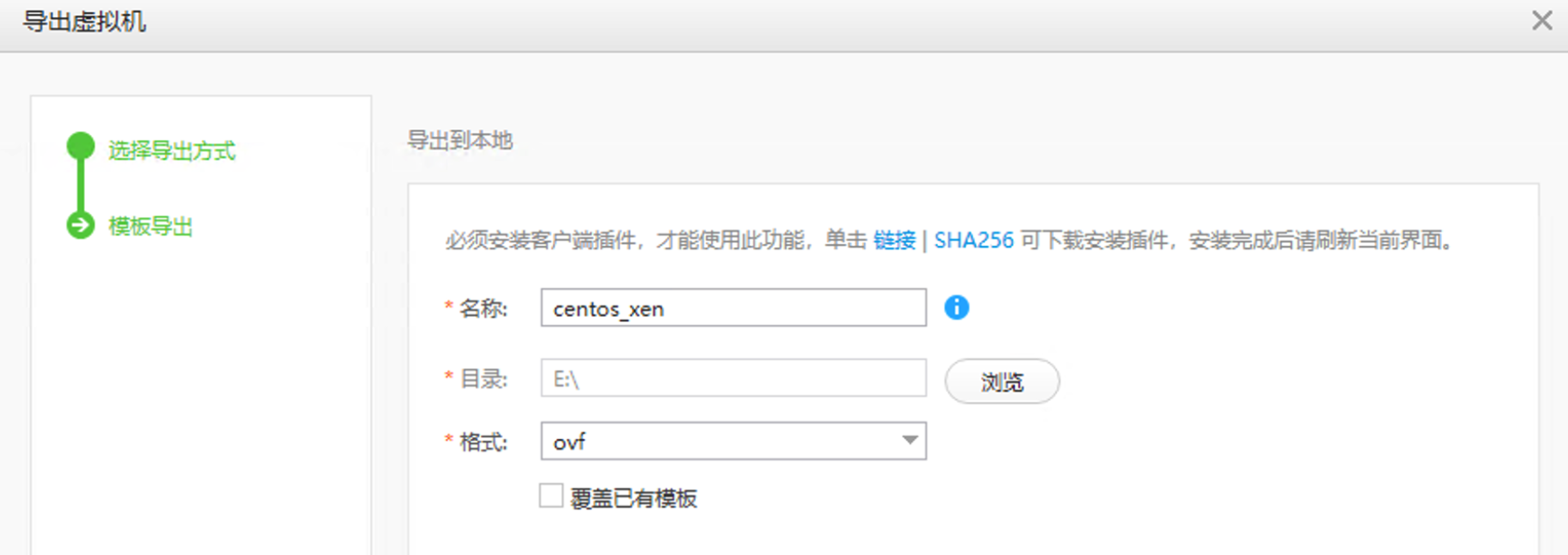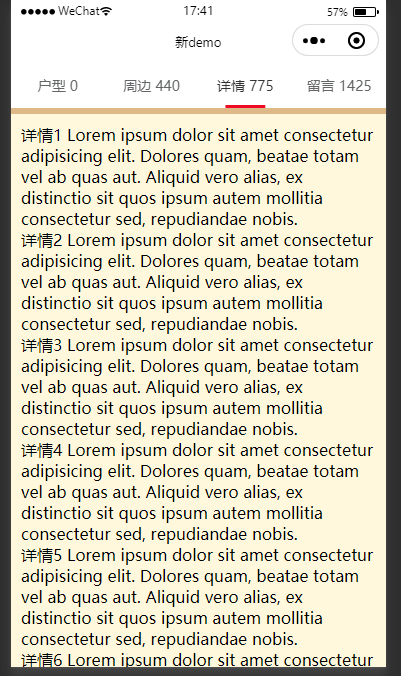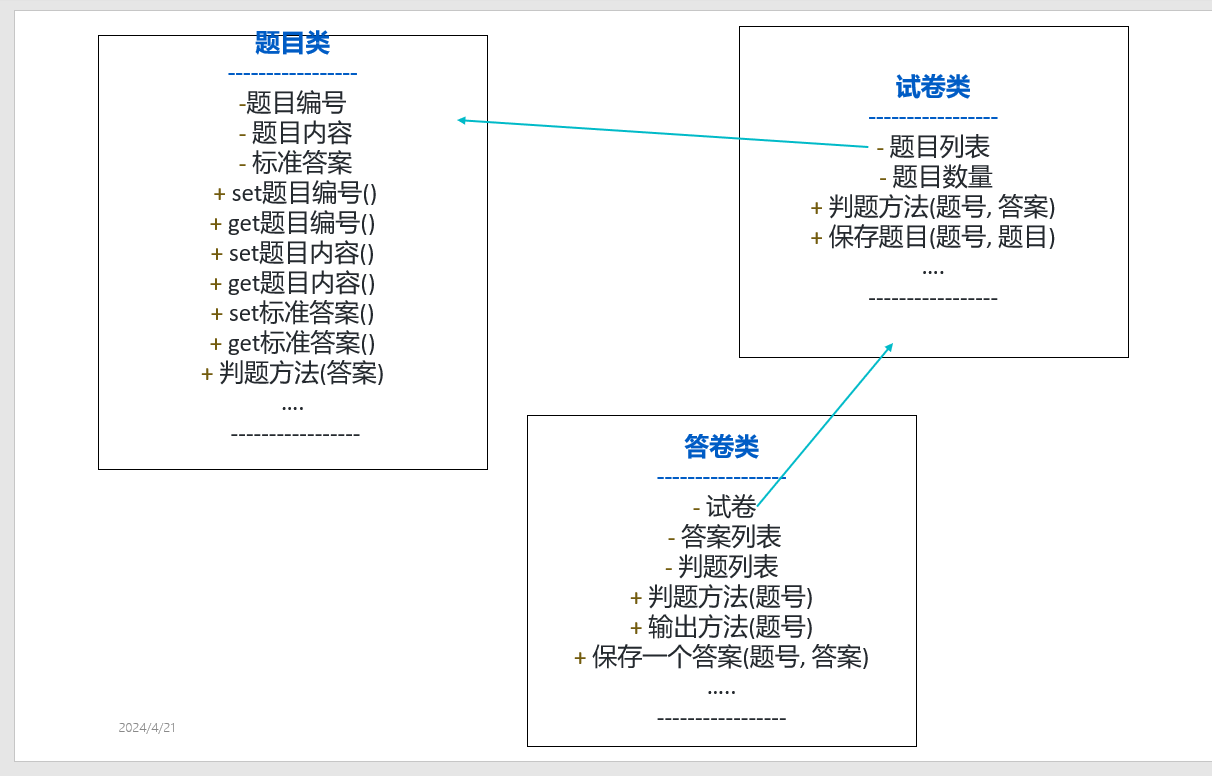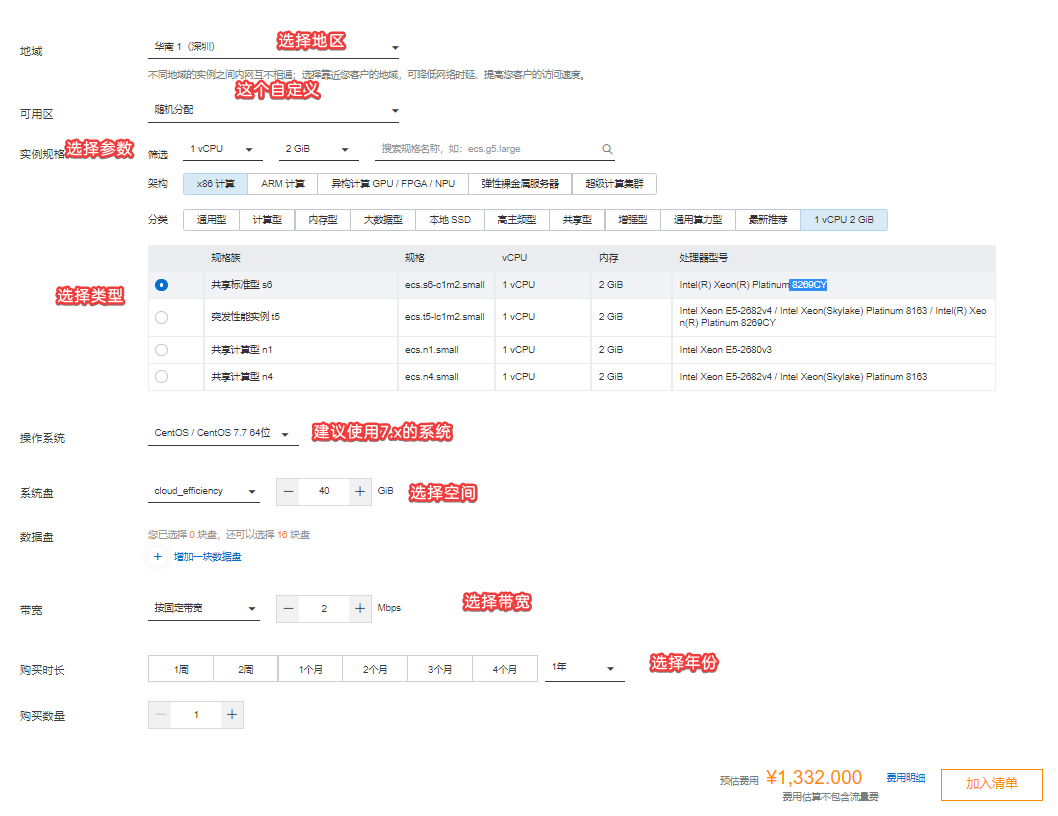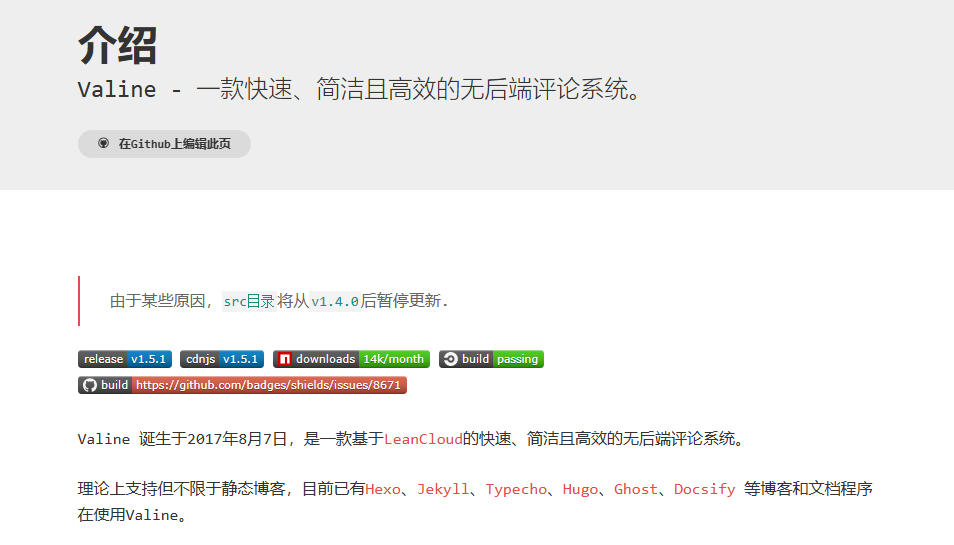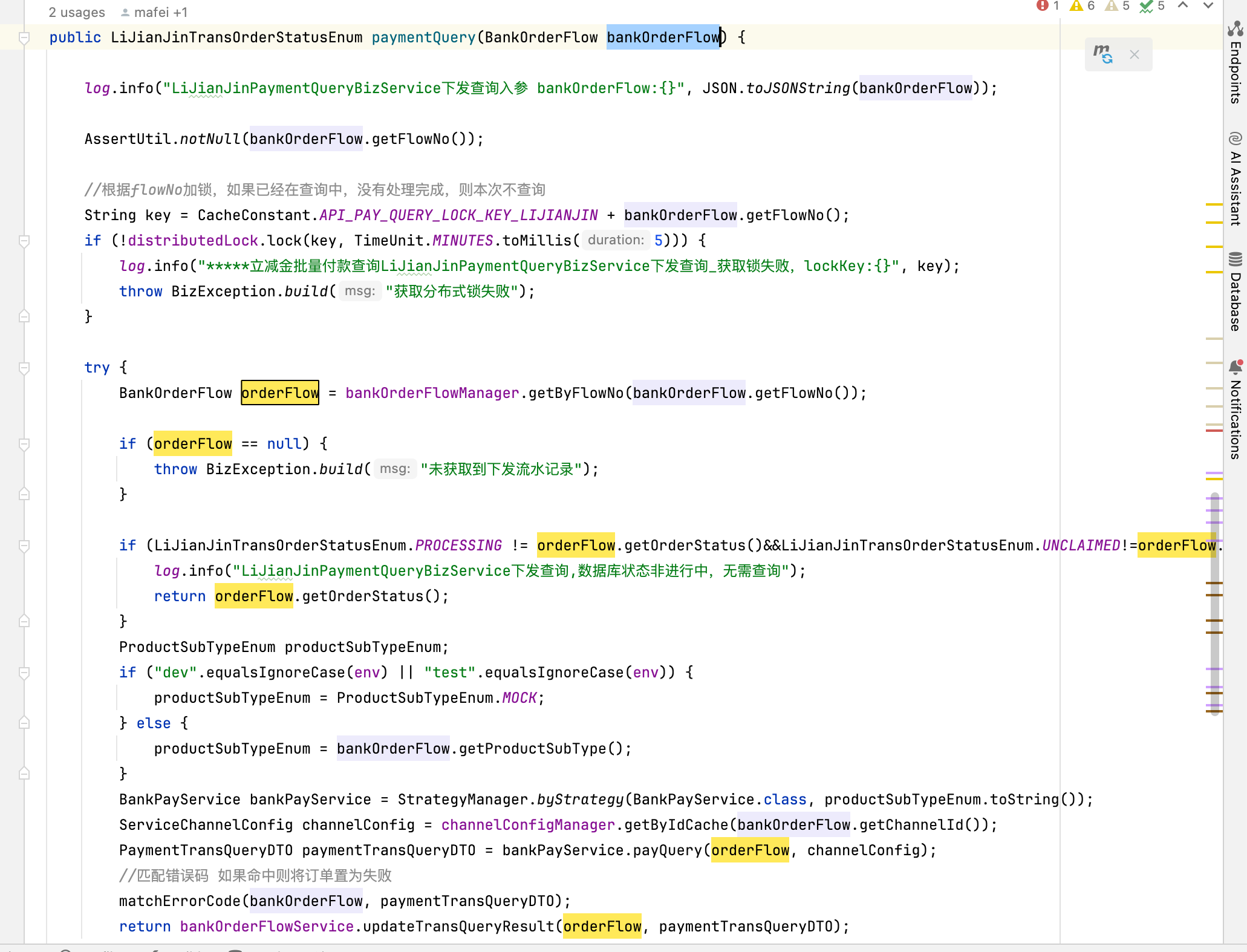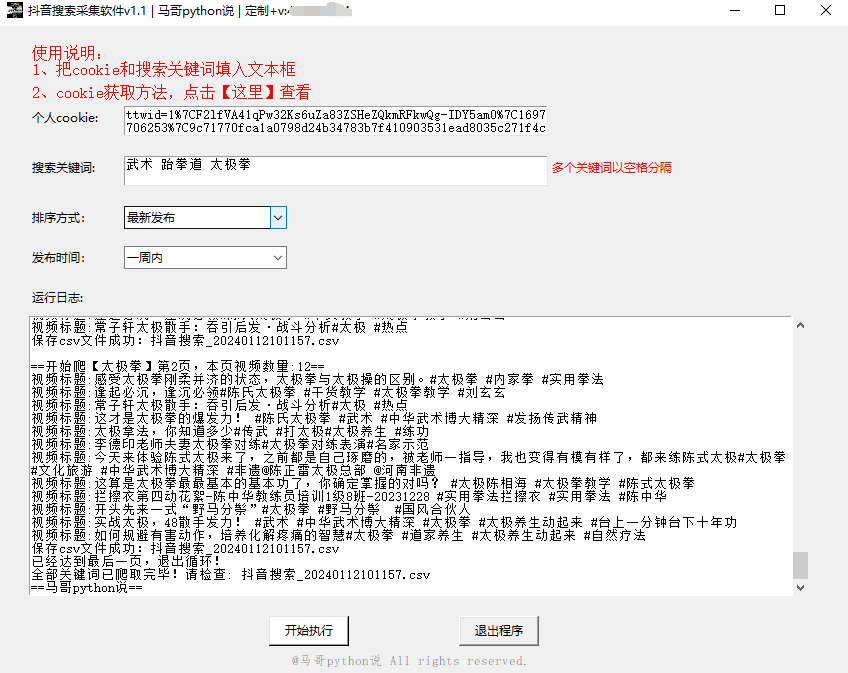一、SpringBoot简介
SpringBoot用来简化spring应用开发,约定大于配置,去繁从简,是J2EE一站式解决方案
2、SpringBoot的优点
-
快速创建独立运行的Spring项目以及主流框架的集成
-
使用嵌入式的Servlet容器,应用无需打成WAR包
-
starts自动依赖与版本控制
-
大量的自动配置,简化开发,也可修改默认值
-
无需配置XML,无代码生成,开箱即用
-
准生成环境的运行时应用监控
-
与云计算天然集成
3、Spring Boot Flow体系结构
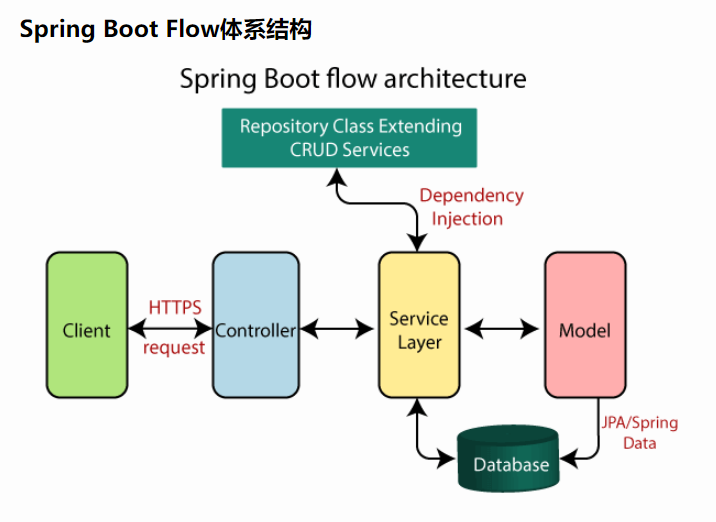
4、SpringBoot项目
1.SpringBoot项目常见目录结构
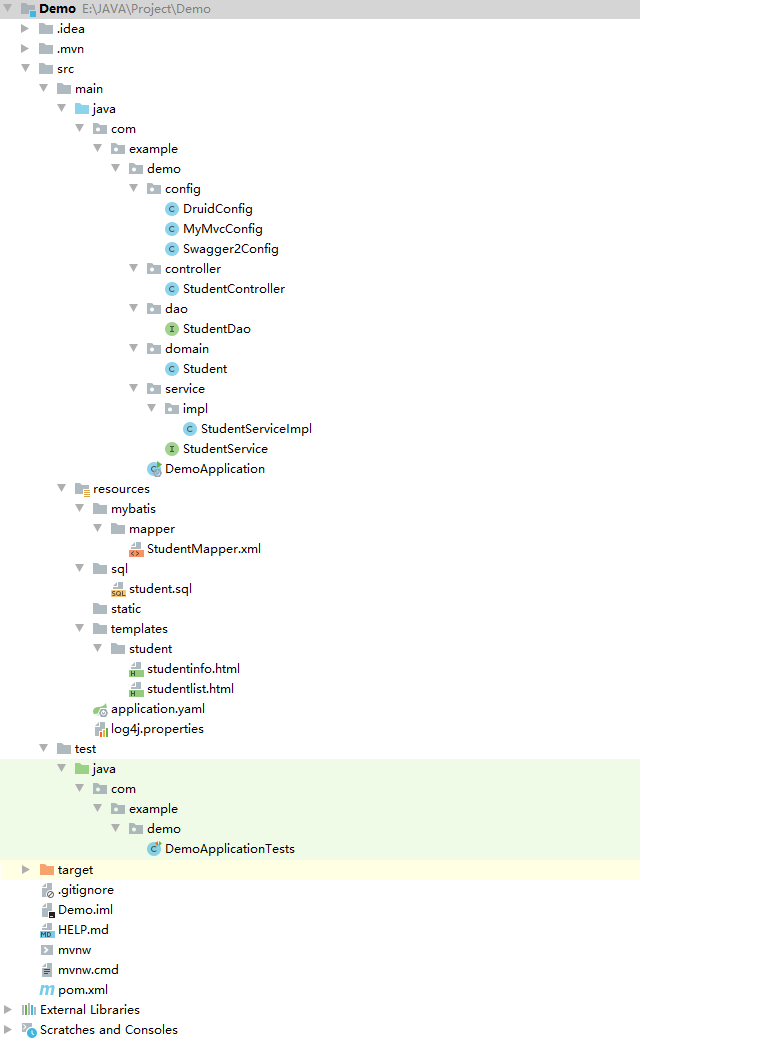
2.SpringBoot项目分层
(1)Controller层:控制层
(2)Service层:业务层
Service层负责业务模块的逻辑应用设计。先设计放接口的类,再创建实现的类,然后在配置文件中进行配置其实现的关联。Service层调用Dao层接口,接收Dao层返回的数据,完成项目的基本功能设计。封装Service层的业务逻辑有利于业务逻辑的独立性和重复利用性。
(3)Dao层:数据访问层
Dao层负责与数据库进行交互。Dao层封装对于数据库的增删改查,不涉及业务逻辑,只是达到按某个条件对数据库中的数据进行某一具体操作的要求。(有的项目中也将Dao层写为Mapper层)
(4)Domain层:数据表对象层
Domain层定义数据库中存储的实体类。(有的项目也将Domain层写为Entity层或Model层)
(5)Config层:配置类层
Config层定义一些与配置有关的类。
3.工作流程
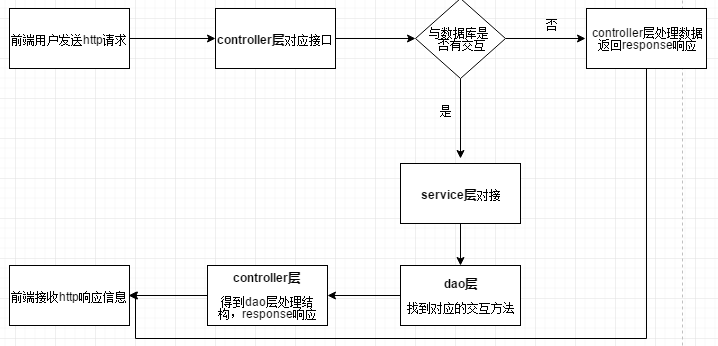
二、Controller层(demo1_controller项目)
1、新建项目
安装
安装
安装
1.项目建立过程
1.
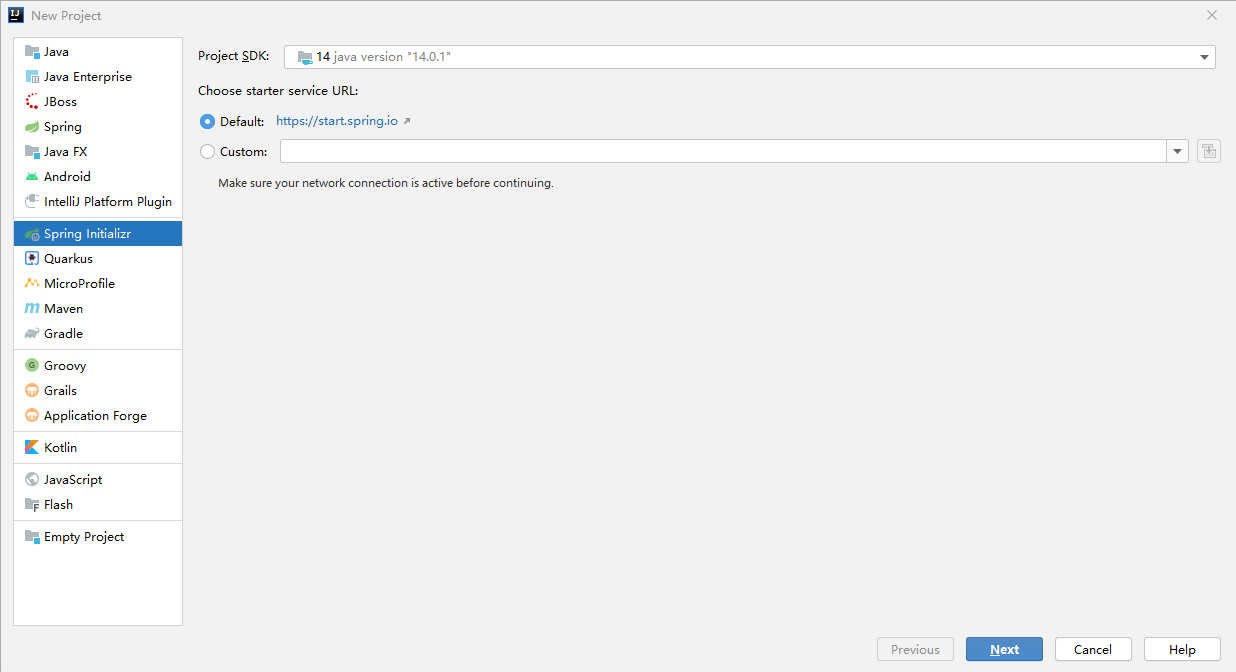
2.填完信息后,点击Next

此处的组织名和项目名由自己命名,仅是一个项目标识符,没有特别的规则
3.此界面可以选择需要的依赖于选择SpringBoot的版本。此时我们只需要用到spring Web依赖,点击Next。如果后续需求有所变化,可以在pom.xml文件进行修改
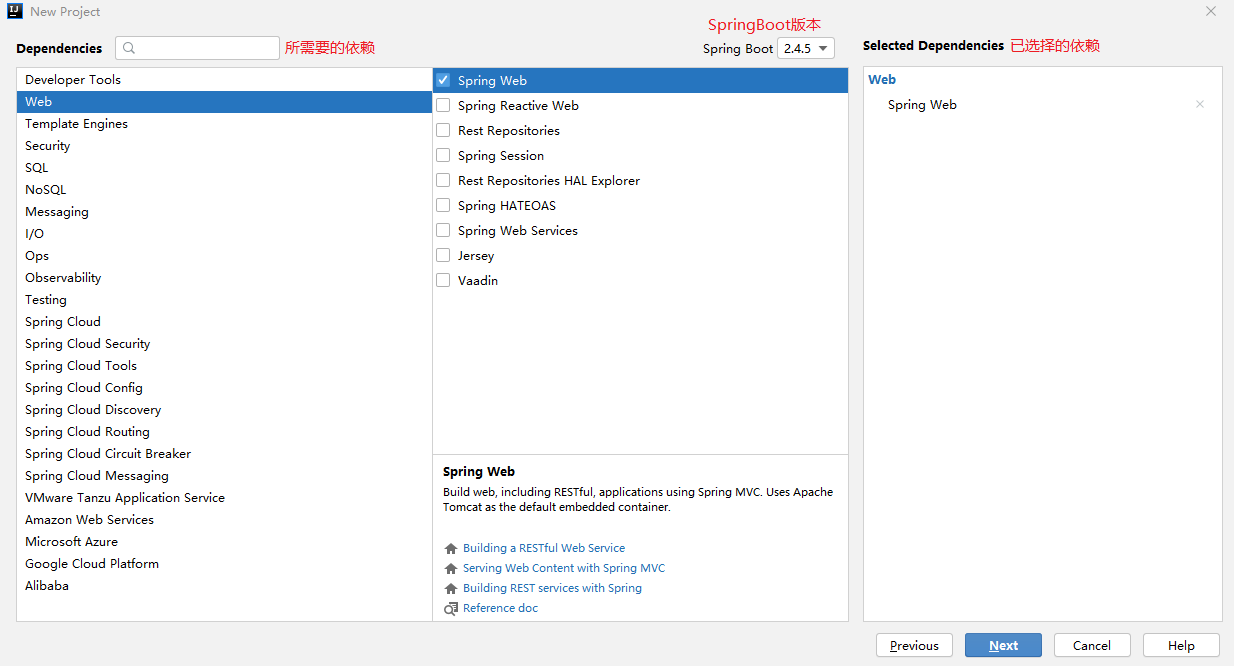
4.检查当前页面,点击Finish,此时已经成功新建一个SpringBoot项目
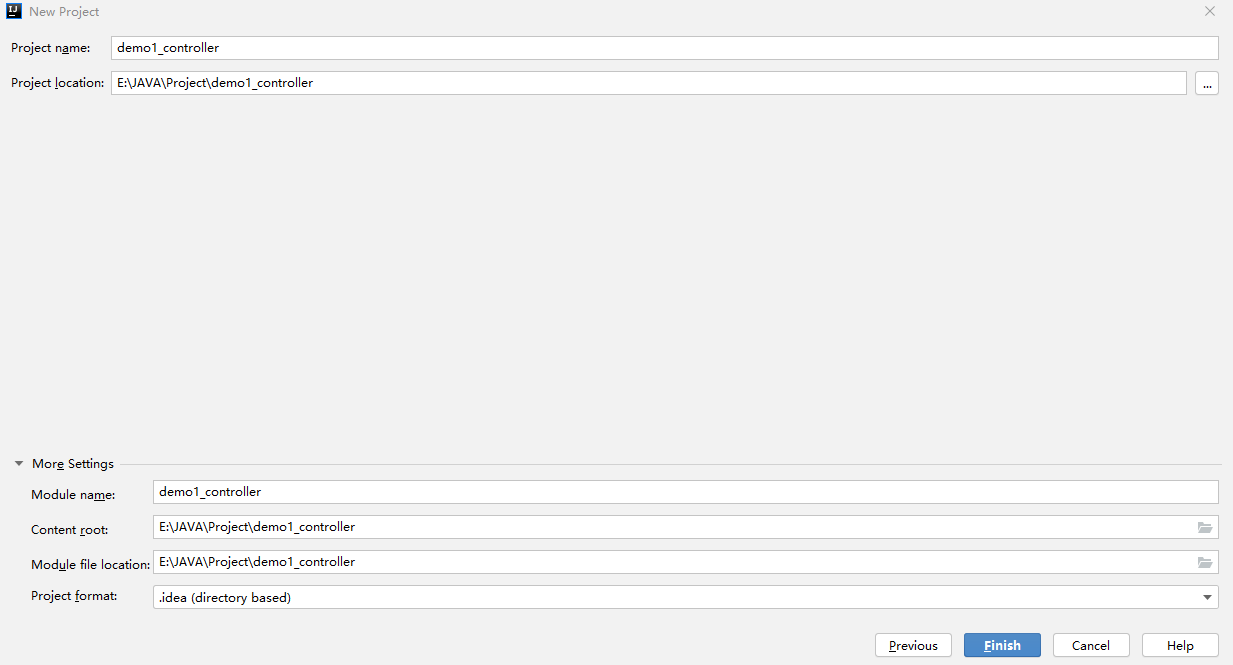
-
-
/src/main/resources目录下目录结构
-
static:保存所有的静态资源 js css images
-
templates:保存所有的模板页面(SpringBoot默认jar包使用嵌入式的Tomcat,默认不支持jsp页面,可以使用模板引擎freemarker、thyleaf),由于现在倾向前后端开发的模式(后台springboot,前端采用vue,react等),因此模板引擎逐渐在被主流技术淘汰。
-
application.properties:SpringBoot应用配置文件,可以修改一些默认设置。(springboot支持properties和yaml两种格式的配置文件,只要文件名是application,springboot均可识别。)
-
-
/src/test/java/com/example/demo1_controller/Demo1ControllerApplicationTests
项目使用的JDK版本可以在
项目使用的Maven版本可以在File->Settings->Build,Execution,Deployment->Build Toos->Maven下修改
3.部分文件内容
查看目前pom.xml的依赖模块
1 <!-- web模块 --> 2 <dependency> 3 <groupId>org.springframework.boot</groupId> 4 <artifactId>spring-boot-starter-web</artifactId> 5 </dependency> 6 <!-- test模块 --> 7 <dependency> 8 <groupId>org.springframework.boot</groupId> 9 <artifactId>spring-boot-starter-test</artifactId> 10 <scope>test</scope> 11 </dependency>
新增maven-compiler-plugin插件指定jdk版本(根据实际情况(就是有没有报错)看是否要加,有的人不加也没有问题)。
1 <build> 2 <plugins> 3 <plugin> 4 <groupId>org.springframework.boot</groupId> 5 <artifactId>spring-boot-maven-plugin</artifactId> 6 </plugin> 7 8 <!-- maven-compiler-plugin插件 指定项目源码及编译后的Jdk版本 --> 9 <plugin> 10 <groupId>org.apache.maven.plugins</groupId> 11 <artifactId>maven-compiler-plugin</artifactId> 12 <version>3.8.1</version> 13 <configuration> 14 <source>1.8</source> 15 <target>1.8</target> 16 </configuration> 17 </plugin> 18 </plugins> 19 </build>
-
application.properties文件内容为空
2、Controller类
1.新建Controller类
-
在/src/main/java/com/example/demo1_controller目录下新建文件夹controller(右键demo1_controller文件夹->New->Package:controller)
-
在controller文件夹下新建类StudentController(右键controller文件夹->New->Java Class:StudentController)
-
在StudentController类上添上注解@Controller,表明这是一个controller类(可以在里面定义一些路由函数)
此时StudentController.java文件全部内容为
1 package com.example.demo1_controller.Controller; 2 3 import org.springframework.stereotype.Controller; 4 5 @Controller 6 public class StudentController { 7 }
2.尝试后端给前端返回一个Hello World内容
在StudentController方法类写HelloWorld()方法
1 @ResponseBody 2 @RequestMapping(value = "/helloworld") 3 public String HelloWorld() { 4 return "Hello World"; 5 }
(1)@RequestMapping("url")是处理请求地址映射,url是请求路径的一部分。(@RequestMapping表明这是一个路由函数)
此时前端请求路径为:http://localhost:8080/helloworld,项目运行结果

@RequestMapping("url")也可以用在controller类上,此时controller类中的方法的请求路径后部分内容为类的url拼接上方法的url
如在controller类上添加@RequestMapping("/student")
1 @Controller 2 @RequestMapping(value = "/student") 3 public class StudentController { 4 5 @ResponseBody 6 @RequestMapping(value = "/helloworld") 7 public String HelloWorld() { 8 return "Hello World"; 9 } 10 }
此时前端请求路径为http://localhost:8080/student/helloworld,项目运行结果

(2)@ResponseBody注解的作用是将controller的方法返回的对象通过适当的转换器转换为指定的格式之后,写入到response对象的body区,通常用来返回JSON数据或者是XML数据
controller类的方法可以通过返回值进行页面跳转,如果采用@ResponseBody则使该方法直接返回数据给前端
@ResponseBody注解可以直接放在controller类上,则表示该类所有方法返回值都是给前端的数据
1 @Controller 2 @ResponseBody 3 @RequestMapping(value = "/student") 4 public class StudentController { 5 6 @RequestMapping(value = "/helloworld") 7 public String HelloWorld() { 8 return "Hello World"; 9 } 10 }
此时项目运行结果与(1)相同
(3)@RestController相当于@ResponseBody + @Controller合在一起的作用,是一种简洁写法。
1 @RestController 2 @RequestMapping(value = "/student") 3 public class StudentController { 4 5 @RequestMapping(value = "/helloworld") 6 public String HelloWorld() { 7 return "Hello World"; 8 } 9 }
此时项目运行结果与(1)相同
3.初始页面
SpringBoot默认的页面映射路径(即模板文件存放的位置)为“classpath:/templates/*.html”。静态文件路径为“classpath:/static/”,其中可以存放JS、CSS等模板共用的静态文件
SpringBoot整合了springmvc的拦截功能,拦截了所有的请求。默认放行的资源是:resources/static/ 目录下所有静态资源。(不走controller控制器就能直接访问到资源)html页面如果放在resources/templates目录下,则需要走controller控制器,controller放行,允许该资源访问,该资源才能被访问到。否则就会报404错误
此时resources/static与 resources/templates 目录下都为空
我们在resources/static目录下新建HTML文件index.html,此时目录结构
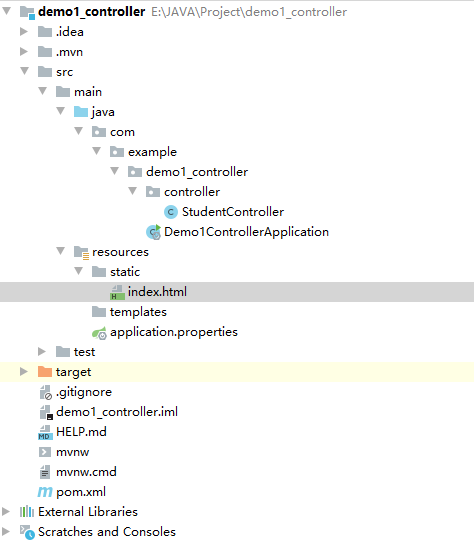
index.html文件内容
1 <!DOCTYPE html> 2 <html lang="en"> 3 <head> 4 <meta charset="UTF-8"> 5 <title>初始页面</title> 6 </head> 7 <body> 8 欢迎来到SpringBoot 9 </body> 10 </html>
项目运行访问初始页面
1 导入thymeleaf依赖
在pom.xml文件<dependencies></dependencies>标签内新增thymeleaf模块
1 <!-- thymeleaf模块 --> 2 <dependency> 3 <groupId>org.springframework.boot</groupId> 4 <artifactId>spring-boot-starter-thymeleaf</artifactId> 5 </dependency>
在pom.xml文件<properties></properties>标签内设置thymeleaf模块版本
1 <!-- 设置thymeleaf模板引擎的模板 --> 2 <thymeleaf.version>3.0.11.RELEASE</thymeleaf.version> 3 <thymeleaf-layout-dialect.version>2.2.2</thymeleaf-layout-dialect.version>
2 新建一个初始页面studentlist.html
在resources/templates目录下新建文件夹stduent,在student文件夹下新建studentlist.html文件

3 编写一个配置类
(2)在config文件夹下新建类MyMvcConfig
(3)MyMvcConfig实现WebMvcConfigurer接口与使用@Configuration表明为配置类
1 package com.example.demo1_controller.config; 2 3 import org.springframework.web.servlet.config.annotation.ViewControllerRegistry; 4 import org.springframework.web.servlet.config.annotation.WebMvcConfigurer; 5 6 @Configuration 7 public class MyMvcConfig implements WebMvcConfigurer { 8 9 /** 10 * 视图控制器 11 * @param registry 12 */ 13 @Override 14 public void addViewControllers(ViewControllerRegistry registry) { 15 //初始页面设置为"student/studentlist" 16 //第一次参数为指定访问路径,第二个参数为指定访问视图名 17 registry.addViewController("/").setViewName("student/studentlist"); 18 } 19 }
此时运行项目的初始页面为

注意:不可在MyMvcConfig上注解@EnableWebMvc,若注解@EnableWebMvc,表明全面接管SpringMVC配置。不使用@EnableWebMvc注解,仅表示在SpringBoot默认配置上对SpringMVC进行扩展
4.CRUD操作
(1)请求路径
| 普通CRUD | RestfulCRUD | |
|---|---|---|
| 查询 | getStudent | student---GET |
| 添加 | addStudent?xxx | student---POST |
| 修改 | updateStudent?id=xxx&xxx=xxx | student/{id}---PUT |
| 删除 | deleteStduent?id=1 | stduent/{id}---DELETE |
普通的CRUD用的是易于理解的请求路径,如getStudent(获取学生,GET请求)、addStudent(添加学生,POST请求)?xxx
RestFul风格的CRUD可以使用同名的请求路径,通过不同的请求方式来区分具体的请求:如查询与添加请求路径都是.../student,但GET方法是查询,POST方法是添加。将url视为资源,根据HTTP请求方式(HTTP协议的内容)对资源产生不同的操作GET是查询、POST是添加、PUT是更新、DELETE是删除。
请求架构
| 请求uri | 请求方式 | |
|---|---|---|
| 查询所有学生 | students | GET |
| 查询某个学生(来到修改页面) | student/{id} | GET |
| 来到添加页面 | student | GET |
| 添加学生 | student | POST |
| 来到修改页面(查询某个学生) | student/{id} | GET |
| 修改学生 | student | PUT |
| 删除学生 | student/{id} | DELETE |
(2)学生实体类
-
在/src/main/java/com/example/demo1_controller目录下新建文件夹domain
-
在domain文件夹下新建类Student
-
1 package com.example.demo1_controller.domain; 2 3 import org.springframework.format.annotation.DateTimeFormat; 4 5 import java.io.Serializable; 6 import java.util.Date; 7 8 /** 9 * Student类 学生实体类 10 */ 11 public class Student implements Serializable { 12 13 private Integer id; //学号 14 private String name; //姓名 15 private Integer score; //成绩 16 private String birthplace; //籍贯 17 //日期的格式 年-月-日 18 @DateTimeFormat(pattern = "yyyy-MM-dd") 19 private Date birthday; //生日 20 21 public Integer getId() { 22 return id; 23 } 24 25 public void setId(Integer id) { 26 this.id = id; 27 } 28 29 public String getName() { 30 return name; 31 } 32 33 public void setName(String name) { 34 this.name = name; 35 } 36 37 public Integer getScore() { 38 return score; 39 } 40 41 public void setScore(Integer score) { 42 this.score = score; 43 } 44 45 public String getBirthplace() { 46 return birthplace; 47 } 48 49 public void setBirthplace(String birthplace) { 50 this.birthplace = birthplace; 51 } 52 53 public Date getBirthday() { 54 return birthday; 55 } 56 57 public void setBirthday(Date birthday) { 58 this.birthday = birthday; 59 } 60 61 @Override 62 public String toString() { 63 return "Student{" + 64 "id=" + id + 65 ", name='" + name + '\'' + 66 ", score=" + score + 67 ", birthplace='" + birthplace + '\'' + 68 ", birthday=" + birthday + 69 '}'; 70 } 71 }
(3)添加学生
①在studentlist.html页面新增添加按钮
1 <!DOCTYPE html> 2 <html lang="en"xmlns:th="http://www.thymeleaf.org"> 3 <head> 4 <meta charset="UTF-8"> 5 <title>学生列表</title> 6 </head> 7 <body> 8 <div> 9 <a th:href="@{/student}"> 10 <button>添加学生</button> 11 </a> 12 </div> 13 </body> 14 </html>
<a></a>标签里的th:href就是请求路径
注意:新建的html文件没有指定使用thymeleaf模板引擎,需要在<html></html>标签里添加xmlns:th="http://www.thymeleaf.org"
studentlist.html页面

②编写controller类的ToStudent()方法
用户点击添加按钮,我们需要能够跳转到学生信息的添加页面,故将/student路径映射到一个可以跳转至学生信息添加页面的方法上
1 package com.example.demo1_controller.controller; 2 3 import org.springframework.stereotype.Controller; 4 import org.springframework.web.bind.annotation.GetMapping; 5 import org.springframework.web.bind.annotation.RequestMapping; 6 import org.springframework.web.bind.annotation.ResponseBody; 7 8 @Controller 9 public class StudentController { 10 11 @ResponseBody 12 @RequestMapping(value = "/helloworld") 13 public String HelloWorld() { 14 return "Hello World"; 15 } 16 17 /** 18 * 来到学生信息页面 19 * @return 20 */ 21 @GetMapping(value = "/student") 22 public String ToStudent() { 23 24 return "student/studentinfo"; 25 } 26 }
因为需要用到页面跳转,所以该controller就不注解为@RestController,需要直接返回数据给前端的可以用@ResponseBody注解
@GetMapping("url")相当于@RequestMapping(valus = "url",method = RequestMethod.GET)也是一种简洁写法。
③新增studentinfo.html页面
在resources/templates/student文件夹下新建studentinfo.html文件,写一个表单输入需要添加的学生信息
1 <!DOCTYPE html> 2 <html lang="en"xmlns:th="http://www.thymeleaf.org"> 3 <head> 4 <meta charset="UTF-8"> 5 <title>学生信息</title> 6 </head> 7 <body> 8 <form th:action="@{/student}" method="post"> 9 <div> 10 <label>学号</label> 11 <input name="id"> 12 </div> 13 <div> 14 <label>姓名</label> 15 <input name="name"> 16 </div> 17 <div> 18 <label>成绩</label> 19 <input name="score"> 20 </div> 21 <div> 22 <label>籍贯</label> 23 <input name="birthplace"> 24 </div> 25 <div> 26 <label>生日</label> 27 <input name="birthday" type="date"> 28 </div> 29 <button type="submit" th:text="添加"></button> 30 </form> 31 </body> 32 </html>
studentinfo.html页面
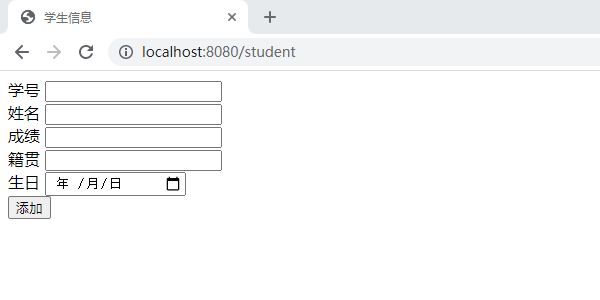
1 /** 2 * 添加学生信息 3 * @param student 4 * @return 5 */ 6 @PostMapping(value = "/student") 7 public String AddStudent(Student student) { 8 9 //执行添加学生信息操作,本项目未连接数据库,仅在控制台输出需要存储的学生数据 10 System.out.println(student); 11 //跳转至学生列表页面 12 return "student/studentlist"; 13 }
@PostMapping("url")相当于@RequestMapping(valus = "url",method = RequestMethod.POST)
⑤业务流程
-
-
- 点击添加按钮回到学生列表页面(与①中页面一样),控制台可以看到前端写入的学生数据

(4)查找学生
①在studentlist.html页面新增学生学号输入框及查找按钮
1 <div> 2 <form th:action="@{/student/{id}}" method="get"> 3 <input name="id"> 4 <button type="submit" th:text="查找"></button> 5 </form> 6 </div>
此处请求路径为xxx/studnet/{id},请求方式为GET
②编写controller类的FindStudentById()方法
1 /** 2 * 查找某个学生信息 3 * @param id 4 * @return 5 */ 6 @GetMapping(value = "/student/{id}") 7 public String FindStudentById(Integer id) { 8 9 //执行通过学生id从数据库查找学生信息操作,本项目未连接数据库,仅在控制台输出学生id 10 System.out.println("所查找学生的学号"+id); 11 //跳转至学生信息页面 12 return "student/studentinfo"; 13 }
③业务流程
-
来到初始页面
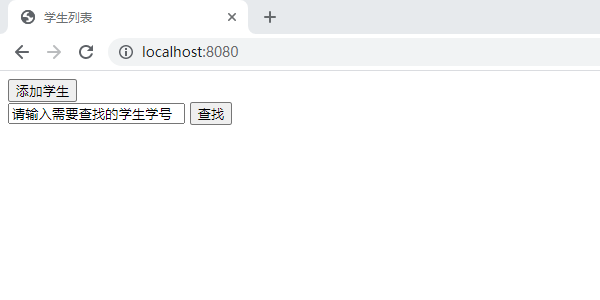
-
在输入框输入需要查询的学生学号
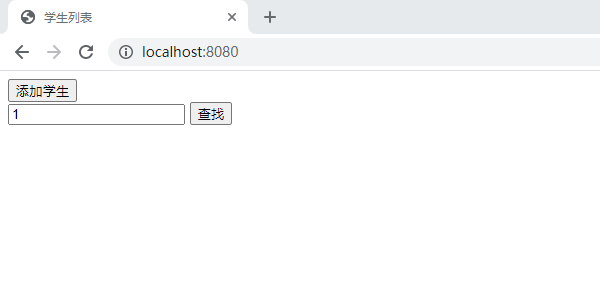
-
点击查找按钮后来到学生信息页面,如果连接了数据库执行了查找操作后会在本页面显示该学生的信息
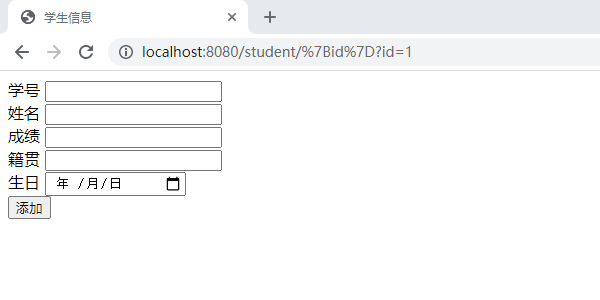
- 控制台输出所查找的学生学号

因为添加学生和查找学生用的同一个学生信息页面,即studentinfo.html,添加学生跳转的学生信息页面下方按钮应该为“添加”,而查找学生跳转的学生信息页面下方按钮可以省略,或者下方变为两个按钮:修改与删除。可以采用判断是否有student值,如果为空则说明是添加学生跳转过来的页面,如果非空则说明是查找学生跳转过来的页面,具体方法在此不详谈。
(5)修改学生
需要修改学生则应当首先查找到学生,查找过程与(4)查找学生相同
由于本项目未连接数据库,无法判断学生信息页面是由添加学生按钮还是查找学生按钮跳转,所以不再实现功能
(6)删除学生
同(5)修改学生,此处不再实现
5、常用注解
-
RequestMapping
1 public @interface RequestMapping { 2 String name() default ""; 3 4 @AliasFor("path") 5 String[] value() default {}; 6 7 @AliasFor("value") 8 String[] path() default {}; 9 10 RequestMethod[] method() default {}; 11 12 String[] params() default {}; 13 14 String[] headers() default {}; 15 16 String[] consumes() default {}; 17 18 String[] produces() default {}; 19 }
-
-
method: 指定请求的method类型, 分为GET、POST、PUT、DELETE等
-
consumes: 指定处理请求的提交内容类型(Content-Type),例如application/json, text/html
-
produces: 指定返回的内容类型,仅当request请求头中的(Accept)类型中包含该指定类型才返回
-
params: 指定request中必须包含某些参数值是,才让该方法处理
-
headers: 指定request中必须包含某些指定的header值,才能让该方法处理请求
-
三、Service层(demo2_service项目)
1、新建项目
新建项目过程与demo1_controller项目类似,不再赘述
2、Servie层处理前端请求并返回数据
1.环境准备
pom.xml文件里也要添加thymeleaf模块,指定thymeleaf版本,以及新增maven-compiler-plugin插件指定jdk版本,具体方法demo1_controller已经展示过
2.新建StudentController类
在src/main/java/com/example/demo2_service目录下新建controller文件夹,并在controller文件夹下新建StudentController类,StudentController上注解@RestController
3.新建Service接口及ServiceImpl类
在src/main/java/com/example/demo2_service目录下新建service文件夹,在service文件夹下新建StudentService接口与impl文件夹,在impl文件夹下再新建StudentServiceImpl类并实现StudentService接口,在StudentServiceImpl类上用@Service注解表明这是一个Service类
4.在Service接口及ServiceImpl类中声明及实现方法
在StudentService接口中声明getFibonacciResult(Integer number)方法
1 /** 2 * 通过前端传入数据计算斐波那契数列值 3 * @param number 4 * @return 5 */ 6 public Integer getFibonacciResult(Integer number);
在StduentServiceImpl类中实现getFibonacciResult(Integer number)方法
1 /** 2 * 通过前端传入数据计算斐波那契数列值 3 * @param number 4 * @return 5 */ 6 @Override 7 public Integer getFibonacciResult(Integer number) { 8 9 if (number == 1 || number == 2) { 10 return 1; 11 } else { 12 return getFibonacciResult(number - 1) + getFibonacciResult(number - 2); 13 } 14 }
5.编写controller类
1 @Autowired 2 StudentService studentService; 3 4 /** 5 * 前端输入初始值,返回斐波那契数列值 6 * @param number 7 * @return 8 */ 9 @RequestMapping("/getFibonacciResult") 10 public Integer getFibonacciResult(Integer number) { 11 12 return studentService.getFibonacciResult(number); 13 }
通过@Autowired自动注入StudentService,就可以从controller层使用service层的类对象,并调用其方法,对象的创建、销毁等生命周期由SpringBoot管理,开发者不用考虑
6.配置SpringMVC
(此步骤非必要,一般是在springboot项目中,修改默认启动页(默认启动页是static/index.html),修改@ResponseBody返回json转换方式,新增资源过滤,配置跨域,添加拦截器等操作需要配置mvc。)
在src/main/java/com/example/demo2_service目录下新建config文件夹,并在config文件夹下新建MyMvcConfig类
MyMvcConfig类
1 package com.example.demo2_service.config; 2 3 import org.springframework.context.annotation.Configuration; 4 import org.springframework.web.servlet.config.annotation.ViewControllerRegistry; 5 import org.springframework.web.servlet.config.annotation.WebMvcConfigurer; 6 7 @Configuration 8 public class MyMvcConfig implements WebMvcConfigurer { 9 10 /** 11 * 视图控制器 12 * @param registry 13 */ 14 @Override 15 public void addViewControllers(ViewControllerRegistry registry) { 16 //初始页面设置为"student" 17 //第一次参数为指定访问路径,第二个参数为指定访问视图名 18 registry.addViewController("/").setViewName("student"); 19 } 20 }
7.新建并编写Student.html文件
在resources/templates目录下新建Student.html文件,并编写一个input输入框与button按钮,用于前端向后端提交数据
1 <!DOCTYPE html> 2 <html lang="en"xmlns:th="http://www.thymeleaf.org"> 3 <head> 4 <meta charset="UTF-8"> 5 <title>Title</title> 6 </head> 7 <body> 8 <div> 9 <form th:action="@{/getFibonacciResult}" method="post"> 10 <input name="number"> 11 <button type="submit" th:text="提交"></button> 12 </form> 13 </div> 14 </body> 15 </html>
8.业务流程
3、Service层将Dao层的数据传递给前端
一般dao层是用于读写数据库的层,此处使用代码中固定的数据来模拟数据库读写,章节四中会连接数据库,演示实际读写数据库的操作。
1.新建StudentDao类
在src/main/java/com/example/demo2_service目录下新建dao文件夹,并在dao文件夹下新建StudentDao类,StudentDao上注解@Repository表明这是一个Dao类
注意:正常SpringBoot项目开发中,Dao层一般设置为接口而非具体类
2.编写StudentDao类
1 package com.example.demo2_service.dao; 2 3 import org.springframework.stereotype.Repository; 4 5 /** 6 * 数据访问层 7 */ 8 @Repository 9 public class StudentDao { 10 11 String studentDaoString = new String("from StudentDao"); 12 13 /** 14 * 得到Dao层数据 15 * @return 16 */ 17 public String getStudentDaoString() { 18 return studentDaoString; 19 } 20 }
此处getStudentDaoString()方法为返回一个字符串
3.编写StudentService接口与StudentServiceImpl类
1 package com.example.demo2_service.service; 2 3 /** 4 * 业务层 5 */ 6 public interface StudentService { 7 8 /** 9 * 通过前端传入数据计算斐波那契数列值 10 * @param number 11 * @return 12 */ 13 public Integer getFibonacciResult(Integer number); 14 15 /** 16 * 得到Dao层数据 17 * @return 18 */ 19 public String getStudentDaoString(); 20 21 }
StudentServiceImpl类
1 package com.example.demo2_service.service.impl; 2 3 import com.example.demo2_service.dao.StudentDao; 4 import com.example.demo2_service.service.StudentService; 5 import org.springframework.beans.factory.annotation.Autowired; 6 import org.springframework.stereotype.Service; 7 8 /** 9 * 业务层 10 */ 11 @Service 12 public class StudentServiceImpl implements StudentService { 13 14 @Autowired 15 StudentDao studentDao; 16 17 /** 18 * 通过前端传入数据计算斐波那契数列值 19 * @param number 20 * @return 21 */ 22 @Override 23 public Integer getFibonacciResult(Integer number) { 24 25 if (number == 1 || number == 2) { 26 return 1; 27 } else { 28 return getFibonacciResult(number - 1) + getFibonacciResult(number - 2); 29 } 30 } 31 32 /** 33 * 得到Dao层数据 34 * @return 35 */ 36 @Override 37 public String getStudentDaoString() { 38 return studentDao.getStudentDaoString(); 39 } 40 }
4.编写StduentController类
1 package com.example.demo2_service.controller; 2 3 import com.example.demo2_service.service.StudentService; 4 import org.springframework.beans.factory.annotation.Autowired; 5 import org.springframework.web.bind.annotation.RequestMapping; 6 import org.springframework.web.bind.annotation.RestController; 7 8 /** 9 * 控制层 10 */ 11 @RestController 12 public class StudentController { 13 14 @Autowired 15 StudentService studentService; 16 17 /** 18 * 前端输入初始值,返回斐波那契数列值 19 * @param number 20 * @return 21 */ 22 @RequestMapping("/getFibonacciResult") 23 public Integer getFibonacciResult(Integer number) { 24 25 return studentService.getFibonacciResult(number); 26 } 27 28 /** 29 * 通过Service层得到Dao层的数据 30 * @return 31 */ 32 @RequestMapping("/getStudentDaoString") 33 public String getStudentDaoString() { 34 return studentService.getStudentDaoString(); 35 } 36 }
5.业务流程
前端访问http://localhost:8080/getStudentDaoString地址
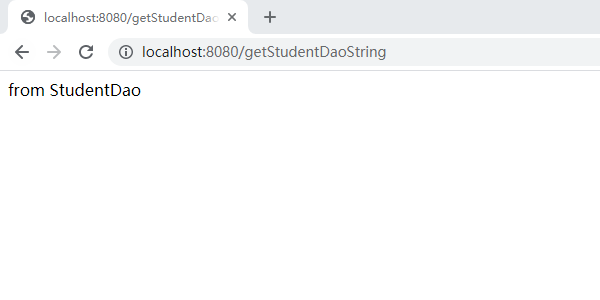
四、Dao层(demo3_dao项目)
1、新建项目
新建项目过程与demo1_controller项目类似,不再赘述
2、环境准备
需要安装
1.pom.xml
jdbc模块、druid模块、log4j2模块、mysql驱动模块、mybatis模块
1 <!-- jdbc模块 spring读写数据库的库 --> 2 <dependency> 3 <groupId>org.springframework.boot</groupId> 4 <artifactId>spring-boot-starter-jdbc</artifactId> 5 </dependency> 6 7 <!-- druid模块 数据库连接池(池子里放一些连接,每次直接取,不用新建提升性能) --> 8 <dependency> 9 <groupId>com.alibaba</groupId> 10 <artifactId>druid</artifactId> 11 <version>1.1.20</version> 12 </dependency> 13 14 <!-- log4j2模块 日志 --> 15 <dependency> 16 <groupId>log4j</groupId> 17 <artifactId>log4j</artifactId> 18 <version>1.2.17</version> 19 </dependency> 20 21 <!-- mysql驱动模块 连接mysql的驱动 --> 22 <dependency> 23 <groupId>mysql</groupId> 24 <artifactId>mysql-connector-java</artifactId> 25 <version>8.0.23</version> 26 </dependency> 27 28 <!-- mybatis模块 spring读写数据库的另一个库 --> 29 <dependency> 30 <groupId>org.mybatis.spring.boot</groupId> 31 <artifactId>mybatis-spring-boot-starter</artifactId> 32 <version>2.1.4</version> 33 </dependency>
同样使用maven-compiler-plugin插件指定项目源码及编译后的Jdk版本
1 <!-- maven-compiler-plugin插件 指定项目源码及编译后的Jdk版本 --> 2 <plugin> 3 <groupId>org.apache.maven.plugins</groupId> 4 <artifactId>maven-compiler-plugin</artifactId> 5 <version>3.8.1</version> 6 <configuration> 7 <source>1.8</source> 8 <target>1.8</target> 9 </configuration> 10 </plugin>
2.application.yaml
默认配置文件为application.properties,我们采用yaml格式的配置文件,在resources文件夹下新建application.yaml文件,原有的application.properties可以删除
spring: datasource: #数据源基本配置 username: root password: 123 url: jdbc:mysql://localhost:3306/springboot?useUnicode=true&characterEncoding=utf8&serverTimezone=GMT%2B8 driver-class-name: com.mysql.cj.jdbc.Driver type: com.alibaba.druid.pool.DruidDataSource initialization-mode: always schema: - classpath:sql/student.sql #数据库建表语句 #配置监控统计拦截的filters,去掉后监控界面sql无法统计,‘wall'用于防火墙 filters: stat,wall,log4j #打开PSCache,并且指定每个连接上PSCache的大小 maxPoolPreparedStatementPerConnectionSize: 20 #合并多个DruidDataSource的监控数据 useGlobalDataSourceStat: true connectionProperties: #druid.stat.mergeSql合并执行的相同sql,避免因为参数不同而统计多条sql语句 #druid.stat.slowSqlMillis用来配置SQL慢的标准,执行时间超过slowSqlMillis的就是慢 druid.stat.mergeSql = true;druid.stat.slowSqlMillis = 500 #使form表单可以发送put请求 mvc: hiddenmethod: filter: enabled: true #mybatis配置 mybatis: #指定sql映射文件路径 mapper-locations: classpath:mybatis/mapper/*.xml
配置文件此处不进行详细说明
3.Druid配置类
在src/main/java/com/example/demo3_dao目录下新建config文件夹,并在config文件夹下新建DruidConfig类。
1 package com.example.demo3_dao.config; 2 3 import com.alibaba.druid.pool.DruidDataSource; 4 import com.alibaba.druid.support.http.StatViewServlet; 5 import com.alibaba.druid.support.http.WebStatFilter; 6 import org.springframework.boot.context.properties.ConfigurationProperties; 7 import org.springframework.boot.web.servlet.FilterRegistrationBean; 8 import org.springframework.boot.web.servlet.ServletRegistrationBean; 9 import org.springframework.context.annotation.Bean; 10 import org.springframework.context.annotation.Configuration; 11 12 import javax.sql.DataSource; 13 import java.util.Arrays; 14 import java.util.HashMap; 15 import java.util.Map; 16 17 /** 18 * Druid配置类 19 */ 20 @Configuration 21 public class DruidConfig { 22 23 @Bean 24 @ConfigurationProperties(prefix = "spring.datasource") 25 public DataSource druid() { 26 return new DruidDataSource(); 27 } 28 29 /** 30 * 配置Druid监控 31 * @return 32 */ 33 //配置一个管理后台的Servlet 34 @Bean 35 public ServletRegistrationBean statViewServlet() { 36 37 ServletRegistrationBean bean = new ServletRegistrationBean(new StatViewServlet(),"/druid/*"); 38 39 Map<String,String> initParams = new HashMap<>(); 40 initParams.put("loginUsername","admin"); 41 initParams.put("loginPassword","123456"); 42 initParams.put("allow",""); //默认允许所有访问 43 bean.setInitParameters(initParams); 44 45 return bean; 46 } 47 48 //配置一个web监控的filter 49 @Bean 50 public FilterRegistrationBean webStatFilter() { 51 FilterRegistrationBean bean = new FilterRegistrationBean(); 52 bean.setFilter(new WebStatFilter()); 53 54 Map<String,String> initParams = new HashMap<>(); 55 initParams.put("exclusions","*.js,*.css,/druid/*"); 56 bean.setInitParameters(initParams); 57 58 bean.setUrlPatterns(Arrays.asList("/*")); 59 60 return bean; 61 } 62 }
4.log4j日志
在resources目录下新建log4j.properties文件。
1 log4j.rootLogger=DEBUG, stdout 2 log4j.appender.stdout=org.apache.log4j.ConsoleAppender 3 log4j.appender.stdout.layout=org.apache.log4j.PatternLayout 4 log4j.appender.stdout.layout.ConversionPattern=%5p [%t] - %m%n
5.student.sql建表语句
在resources目录下新建sql文件夹,将student.sql文件导入sql文件夹
1 SET NAMES utf8; 2 SET FOREIGN_KEY_CHECKS = 0; 3 4 -- ---------------------------- 5 -- Table structure for student 6 -- ---------------------------- 7 CREATE TABLE IF NOT EXISTS `student` ( 8 `id` int NOT NULL COMMENT '学号', 9 `name` varchar(16) CHARACTER SET utf8 COLLATE utf8_general_ci NOT NULL COMMENT '姓名', 10 `score` int NOT NULL COMMENT '成绩', 11 `birthplace` varchar(16) CHARACTER SET utf8 COLLATE utf8_general_ci NOT NULL COMMENT '籍贯', 12 `birthday` date NOT NULL COMMENT '生日', 13 PRIMARY KEY (`id`) USING BTREE 14 ) ENGINE = InnoDB CHARACTER SET = utf8 COLLATE = utf8_general_ci ROW_FORMAT = Dynamic; 15 16 SET FOREIGN_KEY_CHECKS = 1;
6.Student实体类
在src/main/java/com/example/demo3_dao目录下新建domain文件夹,并在domain下新建Student类
3、连接数据库
此时可以在测试类中查看数据源
src/test/java/com/example/demo3_dao/Demo3DaoApplicationTests
1 package com.example.demo3_dao; 2 3 import org.junit.jupiter.api.Test; 4 import org.springframework.beans.factory.annotation.Autowired; 5 import org.springframework.boot.test.context.SpringBootTest; 6 7 import javax.sql.DataSource; 8 import java.sql.Connection; 9 import java.sql.SQLException; 10 11 @SpringBootTest 12 class Demo3DaoApplicationTests { 13 14 @Autowired 15 DataSource dataSource; 16 17 /** 18 * 测试查看数据源 19 * @throws SQLException 20 */ 21 @Test 22 void contextLoads() throws SQLException { 23 System.out.println(dataSource.getClass()); 24 25 Connection connection = dataSource.getConnection(); 26 System.out.println("数据源:"+connection); 27 connection.close(); 28 } 29 }
运行测试类的contextLoads()方法,可在控制台看到druid数据源

通过Navicat可以发现springboot下已经成功新建数据表
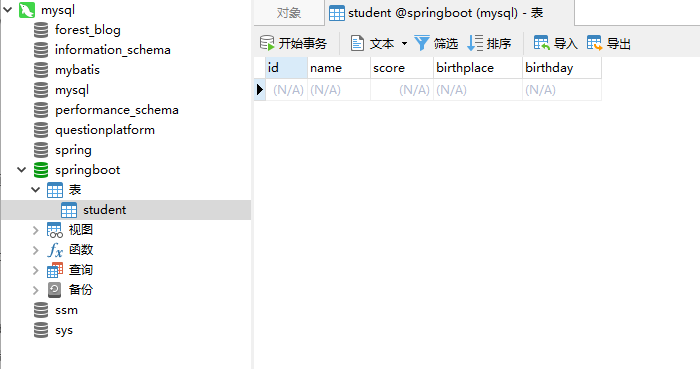
4、注解法进行CRUD
1 package com.example.demo3_dao.dao; 2 3 import com.example.demo3_dao.domain.Student; 4 import org.apache.ibatis.annotations.*; 5 import org.springframework.stereotype.Repository; 6 7 import java.util.List; 8 9 @Mapper 10 @Repository 11 public interface StudentDao { 12 13 /** 14 * 添加学生信息 15 * @param student 16 */ 17 @Insert("INSERT INTO student(id,name,score,birthplace,birthday) VALUES (#{id},#{name},#{score},#{birthplace},#{birthday})") 18 public void AddStudent(Student student); 19 20 /** 21 * 删除学生信息 22 * @param id 23 */ 24 @Delete("DELETE FROM student WHERE id=#{id}") 25 public void DeleteStudentById(Integer id); 26 27 /** 28 * 修改学生信息 29 * @param student 30 */ 31 @Update("UPDATE student SET name=#{name},score=#{score},birthplace=#{birthplace},birthday=#{birthday} WHERE id=#{id}") 32 public void UpdateStudent(Student student); 33 34 /** 35 * 查找某个学生信息 36 * @param id 37 * @return 38 */ 39 @Select("SELECT * FROM student WHERE id=#{id}") 40 public Student FindStudentById(Integer id); 41 42 /** 43 * 查找所有学生信息 44 * @return 45 */ 46 @Select("SELECT * FROM student") 47 public List<Student> FindAllStudent(); 48 }
注意:
@Repository需要在Spring中配置扫描地址,然后生成Dao层的Bean才能被注入到Service层中
@SpringBootApplication
@MapperScan("com.example.demo3_dao.dao")
public class Demo3DaoApplication {
public static void main(String[] args) {
SpringApplication.run(Demo3DaoApplication.class, args);
}
}
@Mapper不需要配置扫描地址,通过xml里面的namespace里面的接口地址,生成了Bean后注入到Service层中
本项目未编写controller层、service层等,就不具体实现其功能,可以通过使用测试类(Demo3DaoApplicationTests)查看是否成功进行数据交互
1.测试添加学生功能
添加学生测试方法
1 /** 2 * 测试添加学生 3 */ 4 @Test 5 public void AddStudent() { 6 7 //默认一个学生信息 8 Student student = new Student(); 9 student.setId(1); 10 student.setName("张三"); 11 student.setScore(100); 12 student.setBirthplace("四川"); 13 SimpleDateFormat simpleDateFormat = new SimpleDateFormat("yyyy-MM-dd"); 14 Date date = new Date(); 15 try { 16 date = simpleDateFormat.parse("2020-02-02"); 17 } catch (ParseException e) { 18 e.printStackTrace(); 19 } 20 student.setBirthday(date); 21 22 //在控制台输出学生信息 23 System.out.println("学生信息:"+student); 24 //将学生信息存入数据库 25 studentDao.AddStudent(student); 26 }
运行测试方法
控制台可以看到学生信息

通过Navicat可以看到数据被写入数据库
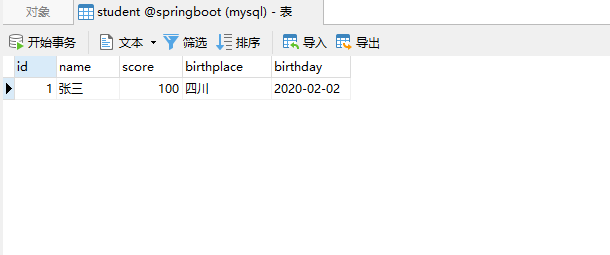
2.测试查找学生功能
通过Navicat在数据库写入几条数据
查找学生测试方法
1 /** 2 * 测试查找学生 3 * @return 4 */ 5 @Test 6 public void FindStudentById() { 7 8 //从数据库查找学生 9 Student student = studentDao.FindStudentById(2); 10 //在控制台输出学生信息 11 System.out.println("查找的学生信息:"+student); 12 }
运行测试方法
3.测试修改学生功能
修改学生测试方法
1 /** 2 * 测试修改学生 3 */ 4 @Test 5 public void UpdateStudent() { 6 7 //默认一个学生信息 8 Student student = new Student(); 9 //待修改学生的学号 10 student.setId(1); 11 //修改其他信息 12 student.setName("张三"); 13 student.setScore(60); 14 student.setBirthplace("新疆"); 15 SimpleDateFormat simpleDateFormat = new SimpleDateFormat("yyyy-MM-dd"); 16 Date date = new Date(); 17 try { 18 date = simpleDateFormat.parse("2020-01-01"); 19 } catch (ParseException e) { 20 e.printStackTrace(); 21 } 22 student.setBirthday(date); 23 24 //在控制台输出学生信息 25 System.out.println("修改后的学生信息:"+student); 26 //修改学生信息 27 studentDao.UpdateStudent(student); 28 }
运行测试方法
可在控制台看到修改后的学生的信息

通过Navicat可以看到数据库中的内容已经被修改

4.测试删除学生功能
删除学生测试方法
1 /** 2 * 测试删除学生 */ 3 @Test 4 public void DeleteStudentById() { 5 //删除学号为2的学生 6 studentDao.DeleteStudentById(2); 7 }
运行测试方法
通过Navicat可以看到数据库中的内容已经被修改
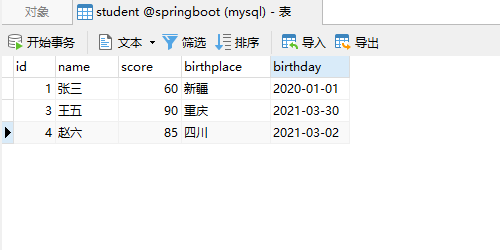
5、配置文件法进行CRUD
1.新建并编写StduentMapper.xml文件
在resources目录下新建mybatis文件夹,在mybatis文件夹下新建mapper文件夹,在mapper文件夹下新建StudentMapper.xml
1 <?xml version="1.0" encoding="UTF-8" ?> 2 <!DOCTYPE mapper 3 PUBLIC "-//mybatis.org//DTD Mapper 3.0//EN" 4 "http://mybatis.org/dtd/mybatis-3-mapper.dtd"> 5 <mapper namespace="com.example.demo3_dao.dao.StudentDao"> 6 7 <!-- 新增学生 --> 8 <insert id="AddStudent"> 9 INSERT INTO student(id,name,score,birthplace,birthday) VALUES (#{id},#{name},#{score},#{birthplace},#{birthday}) 10 </insert> 11 12 <!-- 删除学生 --> 13 <delete id="DeleteStudentById"> 14 DELETE FROM student WHERE id=#{id} 15 </delete> 16 17 <!-- 更新学生 --> 18 <update id="UpdateStudent"> 19 UPDATE student SET name=#{name},score=#{score},birthplace=#{birthplace},birthday=#{birthday} WHERE id=#{id} 20 </update> 21 22 <!-- 查询某个学生 --> 23 <select id="FindStudentById" resultType="com.example.demo.domain.Student"> 24 SELECT * FROM student WHERE id=#{id} 25 </select> 26 27 <!-- 查询所有学生 --> 28 <select id="FindAllStudent" resultType="com.example.demo.domain.Student"> 29 SELECT * FROM student 30 </select> 31 32 </mapper>
2.在application.yaml文件中配置mybatis信息
1 #mybatis配置 2 mybatis: 3 #指定sql映射文件路径 4 mapper-locations: classpath:mybatis/mapper/*.xml
3.StudentDao.interface方法名与StduentMapper.xml中的id名要一一对应
如StduentDao.interface中新增学生
1 public void AddStudent(Student student);
StudentMapper.xml中新增学生
1 <!-- 新增学生 --> 2 <insert id="AddStudent"> 3 INSERT INTO student(id,name,score,birthplace,birthday) VALUES (#{id},#{name},#{score},#{birthplace},#{birthday}) 4 </insert>
此时StudentDao.interfeace内容为
1 package com.example.demo3_dao.dao; 2 3 import com.example.demo3_dao.domain.Student; 4 import org.apache.ibatis.annotations.*; 5 import org.springframework.stereotype.Repository; 6 7 import java.util.List; 8 9 @Mapper 10 @Repository 11 public interface StudentDao { 12 13 /** 14 * 添加学生信息 15 * @param student 16 */ 17 public void AddStudent(Student student); 18 19 /** 20 * 删除学生信息 21 * @param id 22 */ 23 public void DeleteStudentById(Integer id); 24 25 /** 26 * 修改学生信息 27 * @param student 28 */ 29 public void UpdateStudent(Student student); 30 31 /** 32 * 查找某个学生信息 33 * @param id 34 * @return 35 */ 36 public Student FindStudentById(Integer id); 37 38 /** 39 * 查找所有学生信息 40 * @return 41 */ 42 public List<Student> FindAllStudent(); 43 }
本项目未编写controller层、service层等,就不具体实现其功能
可以从测试类中验证CRUD操作,与注解法类似,此处不再演示
1、目录结构
见 一、SpringBoot简介->4、SpringBoot项目->1.SpringBoot项目常见目录结构
2、层级简介
src/main/java/com/example/demo目录下
config是配置文件夹
controller是控制层文件夹
dao是数据访问层文件夹
domain是数据表对象层文件夹
service是业务层文件夹
src/main/resources文件夹下
mybatis是mybatis相关文件夹
sql是Mysql语句文件夹
static是静态资源文件夹
templates是模板文件夹
src/test目录下与测试相关
pom.xml与配置依赖相关
3、CRUD演示
1.添加学生
初始页面
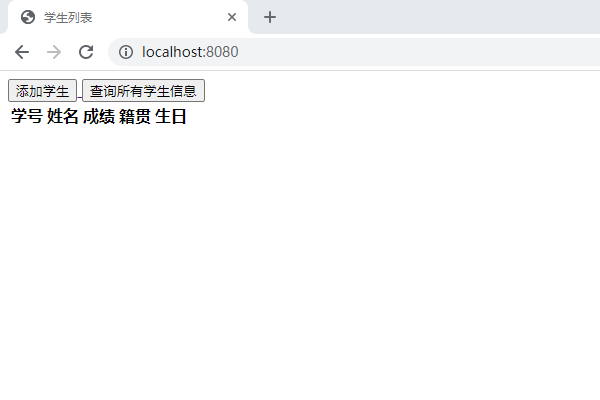
进入添加页面并填写信息
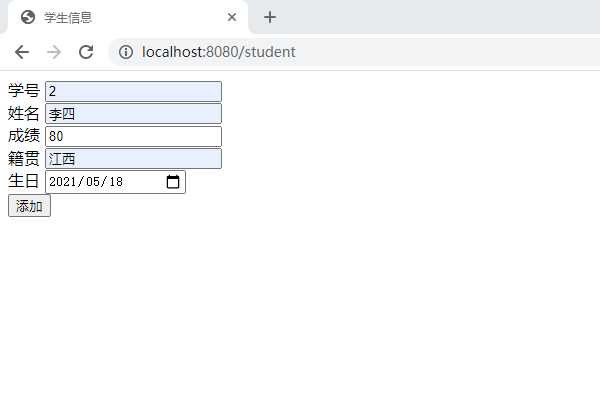
点击添加按钮回到学生列表页面
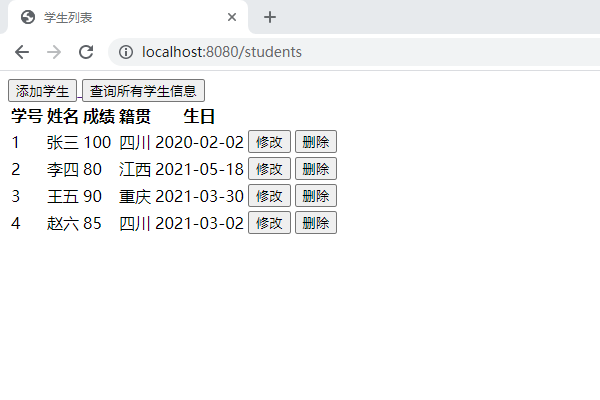
此项目仅做了查询所有学生信息,点击“查询所有学生信息”按钮即可在学生列表页面看到所有学生信息
3.修改学生
点击需要修改的学生信息右侧的修改按钮,此处选择修改2号学生,进入修改页面
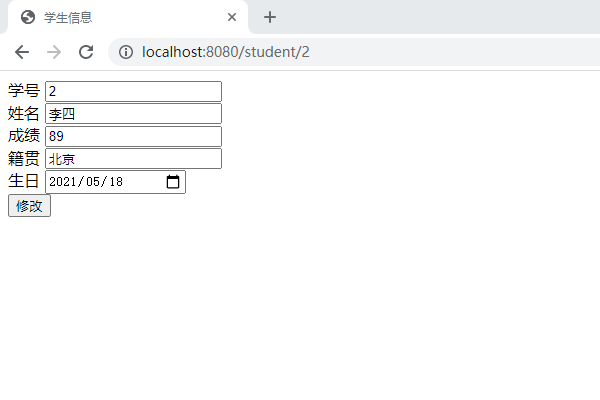
点击修改按钮返回至学生列表页面
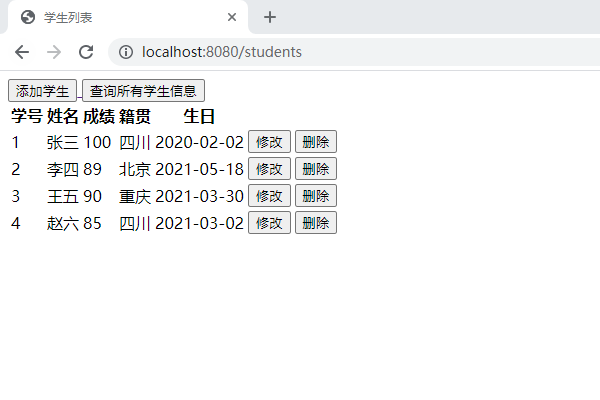
4.删除学生
点击需要删除的学生信息右侧的删除按钮,此处选择删除4号学生,刷新学生列表页面
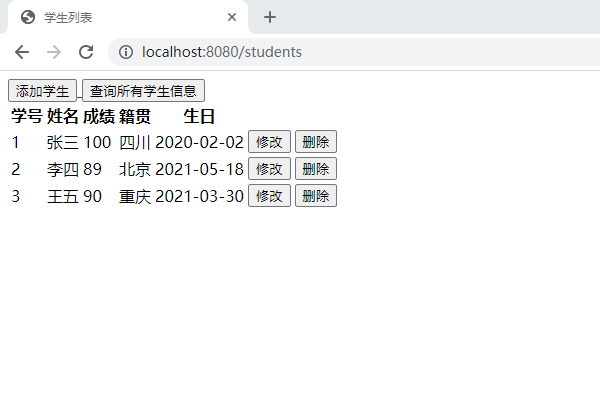
文章理论部分主要来自B站 尚硅谷SpringBoot顶尖教程(springboot之idea版spring boot) 及数篇其他博客 在此不一一说明出处
